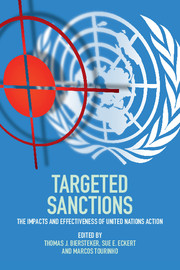Book contents
- Frontmatter
- Contents
- List of figures
- List of tables
- List of contributors
- List of abbreviations
- Introduction
- 1 Thinking about United Nations targeted sanctions
- 2 The purposes of targeted sanctions
- 3 Security Council dynamics and sanctions design
- 4 United Nations targeted sanctions and other policy tools: diplomacy, legal, use of force
- 5 The relationship between United Nations sanctions and regional sanctions regimes
- 6 Coordination of United Nations sanctions with other actors and instruments
- 7 Implementation of United Nations targeted sanctions
- 8 The impacts of United Nations targeted sanctions
- 9 The unintended consequences of United Nations targeted sanctions
- 10 The effectiveness of United Nations targeted sanctions
- 11 Institutional learning in targeting sanctions
- 12 Conclusion
- Appendix 1 List of cases and episodes
- Appendix 2 Sanctions effectiveness
- Appendix 3 TSC database codebook
- Appendix 4 Targeted Sanctions Consortium (TSC) participants
- Bibliography
- Index
5 - The relationship between United Nations sanctions and regional sanctions regimes
Published online by Cambridge University Press: 05 March 2016
- Frontmatter
- Contents
- List of figures
- List of tables
- List of contributors
- List of abbreviations
- Introduction
- 1 Thinking about United Nations targeted sanctions
- 2 The purposes of targeted sanctions
- 3 Security Council dynamics and sanctions design
- 4 United Nations targeted sanctions and other policy tools: diplomacy, legal, use of force
- 5 The relationship between United Nations sanctions and regional sanctions regimes
- 6 Coordination of United Nations sanctions with other actors and instruments
- 7 Implementation of United Nations targeted sanctions
- 8 The impacts of United Nations targeted sanctions
- 9 The unintended consequences of United Nations targeted sanctions
- 10 The effectiveness of United Nations targeted sanctions
- 11 Institutional learning in targeting sanctions
- 12 Conclusion
- Appendix 1 List of cases and episodes
- Appendix 2 Sanctions effectiveness
- Appendix 3 TSC database codebook
- Appendix 4 Targeted Sanctions Consortium (TSC) participants
- Bibliography
- Index
Summary
One of the most notable developments in the sanctions landscape over the past couple of decades has been the proliferation of sanctions imposed by regional organizations. Of the sixty-three United Nations sanctions episodes studied by the consortium, forty-three involve regional organizations, in some cases a multiplicity of them. In twelve sanctions regimes, regional sanctions preceded the UN sanctions, and in ten cases, unilateral sanctions preceded UN sanctions. In fact, only six episodes are of stand-alone UN sanctions. This suggests that states subject to sanctions are increasingly targeted by a combination of UN and regional measures.
This development is interesting for several reasons. First, the use of sanctions outside of the framework of the UN has illustrated the willingness of regional organizations to employ coercive measures within their regions, even in the case of organizations created fairly recently. From this vantage point, it is symptomatic of the rise of regional governance. Second, in the past, sanctions had been criticized by Third-World leaders as a tool to impose a Western agenda on them. Indeed, many regional organizations in the developing world emerged as post-colonial projects with the explicit aim of shielding sovereign governments from external interference. The fact that some regional organizations now employing sanctions most frequently are located outside of the Western world is indicative of these measures’ growing legitimacy and usefulness as foreign policy tools. In addition, the increasingly frequent resort to sanctions signifies that some regions in the developing world, which have been traditionally at the receiving end of sanctions, are taking ownership of their security governance.
Despite the proliferation of sanctions adopted by regional arrangements, little attention has been devoted to them or to their relationship with UN sanctions. To date, research has focused primarily on regional organizations as implementers of UN sanctions – an issue that has gained currency especially following successful legal challenges to legislation giving effect to UN blacklists of individuals. But important questions as to the interrelationship between regional and UN sanctions exist – such as whether they complement or conflict with each other, and whether regional organizations follow the lead of UN sanctions or set the stage for the UN to act. This chapter explores the relationship between mandatory sanctions imposed by the UN Security Council, on the one hand, and regional organizations, on the other.
- Type
- Chapter
- Information
- Targeted SanctionsThe Impacts and Effectiveness of United Nations Action, pp. 101 - 118Publisher: Cambridge University PressPrint publication year: 2016
- 3
- Cited by



